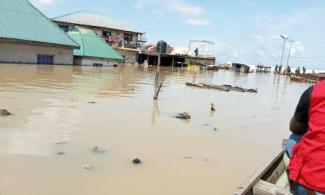
NiMet asserted that some state governments did not relocate people on time to high grounds after they were adequately and timely warned about the impending crisis.
The Nigerian Meteorological Agency (NiMet) has blamed some state governments for the high impact of the recent flood crisis that killed thousands of Nigerians.
NiMet asserted that some state governments did not relocate people on time to high grounds after they were adequately and timely warned about the impending crisis.
The Director General of NiMet, Prof. Mansur Bako Matazu, made this known on Thursday in Abuja during a programme organised by the Human and Environmental Developmental Agenda (HEDA) tagged ‘Climate Information Service On The Food Crisis’.
Matazu, who was represented by the Executive Assistant to the DG of NiMET, James Adamu, at the programme themed: 'Averting a National Food Crises Post 2022 Flooding,' noted that the problem is multifaceted.
He said, "The problem is multifaceted, some of the people affected did not get the information, while some got the information but chose to ignore it.
"Some others got the information but no alternative was made in terms of relocation by the state governments.
"The mandate of NiMet is to provide early warning, and we will further work closely with government at all levels to take the warning to every Nigerian.”
"NiMet will engage youths, the agency's social media to help disseminate this information and most importantly the media for wide publicity on our impact-based forecast," he added.
NiMet, however, advised Nigerian farmers and other stakeholders in the agricultural sector to take full advantage of farming in the dry season as part of efforts to prevent a food crisis in 2023 in the country.
"Dry season farming seems to be more productive, and the risk associated with weather is less during the dry season. So, if people that have been affected are encouraged to go into dry season farming, you will find out that the effect on livelihood and food and nutrition insecurity in the country will be reduced.
"If we get our youths and engage them in agriculture, different forms of agriculture, vices in terms of conflict and insurgency, I think we will have some relief that people will be engaged and they will not have time to be recruited as miscreants in the society," he said.
However, Permanent Secretary in the Adamawa State Ministry of Agriculture, Mrs Dorothy Y. Augustine, who was at the event, told SaharaReporters that NiMet’s warning came late
She said, "The warning came late; farmers had already planted their crops and were waiting for harvest when the floods came.
"It is not easy to relocate farmers because they wouldn't like to leave their ancestral homes. On the part of the government, adequate budgetary provision has to be made in order to give compensation to farmers before they are relocated.”
"His excellency Rt Hon Ahmadu Umaru Fintiri has graciously approved the procurement of blended fertiliser, which will soon be distributed to farmers for dry seasoning farming, so as to alleviate their suffering and to promote food security in the state," she added.
SaharaReporters had been reporting massive flooding across the country with devastating and harrowing experiences of Nigerians living in many coastal and non-coastal lines.
According to the National Emergency Management Agency (NEMA), over 300 people have been killed by devastating floods across Nigeria in 2022.
Also, hundreds of communities have been submerged in Delta, Anambra, Bayelsa, Adamawa, Taraba, Benue, Kogi, Jigawa, Kano, and Sokoto, amongst others with thousands of residents displaced and hectares of farmlands washed away, a development that analysts have opined could aggravate food crisis.
NEMA had also warned that the 2022 flood disaster will be worse than that of 2012 when at least 363 people were killed and over 2.1 million people were displaced by floods.